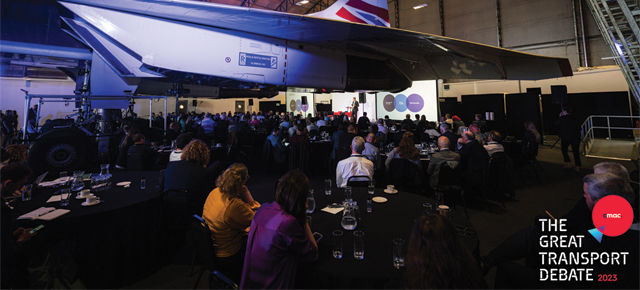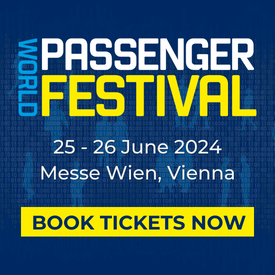‘It’s the thing everyone wants but in so many ways it remains elusive. Last week’s Great Transport Debate examined why we can’t join up journeys

Why hasn’t more progress been made to integrate different modes of transport to create seamless door-to-door journeys that rival, or exceed, the convenience of the private car? This was a recurrent theme at last week’s Great Transport Debate in Manchester.
This was a brand-new transport event that was billed as being unlike any other. It was the brainchild of CMAC, experts in planned and emergency ground transport solutions, and it brought together executives from the air, rail, bus, micro-mobility, taxi and active travel sectors in Manchester Airport’s Concorde Hanger.
Ambitions for the future of transport were debated underneath a Concorde aircraft, a reminder of the ambition and ingenuity of a previous generation. And the debate was co-hosted by two transport experts who have spent their careers moving freely between different modes – Neil Micklethwaite, chief operating officer of CMAC Group, and Alex Warner, founder of AJW Experience Group.
A passionate plea for greater integration was made by Clive Wratten, chief executive of the Business Travel Association. He argued that the fragmentation of the transport sector was frustrating for travellers, but also unsustainable from an environmental perspective.
From personal experience, numerous recent trips I have taken using public transport have been far from seamless, not all, but far too many
“From personal experience, numerous recent trips I have taken using public transport have been far from seamless, not all, but far too many,” said Wratten. “I am confident this sentiment resonates with many of you present here today, and I am also totally confident none of you want this to be the case.
“Currently the industry is highly fragmented, causing unnecessary issues for business travellers … It is time for change. It is time to make travelling in the UK a seamless experience, Bridging the gaps between different transport modes. We need to foster open dialogue and take meaningful action to build a transport system that is user-friendly, efficient and responsive to the needs of those on the journey.
“We need to park competition for the sake of our planet and our economy. To do this it is vital that we prioritise greater collaboration and measurable action. Meetings are all well and good but if we aren’t coming out of them with tangible targets, roadmaps and KPIs, then frankly what are we achieving? Put simply, we can’t have competition without a functioning planet. We need to create an integrated transport network not empty promises.”
Jacqueline Starr, CEO of Rail Delivery Group offered a candid assessment of why greater integration has not been achieved.
At the moment multimodal integration en masse, I am speaking on behalf of the industry as a whole, is not a priority. It’s very much an add-on to conversations
“At the moment multimodal integration en masse, I am speaking on behalf of the industry as a whole, is not a priority,” she confessed. “It’s very much an add-on to conversations.”
She continued: “There is still a lot of competition between modes, and that’s not fostering the type of relationships and behaviours and prioritisation and investment.
“I think there is also, dare I say, a slight behavior and cultural issue also in terms of the appetite to truly address the need and desire and the expectation of our customers now to have that end-to-end experience, regardless of modes.
“And finally I think there is a gap in terms of data and being able to understand that first and last mile piece specifically, and really identify the needs of those customers in a way that really creates a compelling story for us internally to lobby against some of those that perhaps don’t want to respond to that growing customer need.”
James Hammet, managing director of light rail umbrella group UKTram, also sees competition between modes as a barrier to integration. He contrasted this with the seamless experience of booking a package holiday, which might include flights, coaches, taxis, hotels and food: “Everything is all in one and I have paid at one point, so why are we not doing that in transport? It’s doable.”
Jacqueline Starr spoke about some of the work that is being done in the rail industry on issues like fares and ticketing and digitalisation to improve the journey experience, but warned that it is still happening in isolation: “It will take years to develop. It will take more years to deliver, and therefore if we don’t approach that on the basis of
mass integration, this situation remains unchanged for the next five to ten years. So we have to find a way to work together and combine that change now.”
Alex Warner, whose career has spanned Tube, aviation, rail, coach, bus and more, believes that the transport sector exists in entrenched modal silos that need to be broken down. He said that train company bosses often don’t know the bus bosses on their patch, and vice versa – even when they are working for the same owning group.
Should the CEOs of the various owning groups seriously earn their money by forcing, right down to frontline managers, through their MDs, the bus and rail companies to talk to each other? This is why they are paid big bucks, surely?
He asked: “Should the CEOs of the various owning groups seriously earn their money by forcing, right down to frontline managers, through their MDs, the bus and rail companies to talk to each other? This is why they are paid big bucks, surely?”
Nigel Stevens, chair of transport user watchdog Transport Focus, believes that the technology sector can help to join up the transport sector – if the latter does not impede them.
“They are already doing a lot of this work of joining up the dots and at the moment they are held at arm’s length, particularly I would argue in the rail sector where they are seen as the enemy, to a degree,” he said. “Actually if we can get the Citymappers of this world, the trainlines of this world, engaged and control their behaviors through data control, we can actually harness that power and that technology … It doesn’t matter who owns the customer. It needs to be somebody who can deliver the goods.”
This prompted Neil Micklethwaite to harness the power of techology to pose the following question to the audience: “Can Amazon sell tickets for us?”
“They distribute revenue to individuals in China, distribution companies in the USA, couriers,” said Micklethwaite. “They all get their money and it goes to the right place.”
Later on, Graham Vidler, chief executive of CPT, suggested that a reality check was needed.
I think integration is important and will become more important. I don’t think it’s anywhere near the top of passenger’s priority list at the moment
“If I could offer a slightly dissenting view on some of the debate we have had so far actually, I think there’s a question here about priorities and what’s most important to passengers,” he said. “I think integration is important and will become more important. I don’t think it’s anywhere near the top of passenger’s priority list at the moment.”
Reliability, he said, was top of the wish-list for bus users: “So I think all of our focus, the vast majority of our focus, should be on cracking the things that get in the way of reliability, and in the bus sector that’s a shortage of drivers, it’s unreliable journey times because of congested roads. Those are the things that are most important right now.
“The commercials will drive integration when it becomes more of a priority for passengers, and when passengers are demanding that sort of integration.”
It was mid-way through the afternoon and Claudette Anderson, partnerships manager at Go Jauntly, said it was shameful that nobody had yet mentioned walking or cycling in the context of a discussion about multi-modal transport. Go Jauntly is a walking app that has worked with Transport for London, South Western Railway and soon Transport for Wales.
Walking is the most successful mode of transport and we need to recognise it as a mode of transport
“Walking is the most successful mode of transport and we need to recognise it as a mode of transport,” she said. “If you are a public transport authority or an operator … You need to be talking about that. You need to be making it very clear that that is part of your journey experience … You need to be talking about that. You need to be showing that you care about that, and that you know it’s part of a really interesting, fun enjoyable experience for people every day. Nothing makes people more connected to where they are than walking.”
Anderson asked why transport operators and authorities don’t talk more about the environment. “Modal share is a huge part of the nature recovery plan,” she said. “Climate emergency is here. The biodiversity crisis is here. The mental health crisis is here. We are all living through that every day. Are public transport operators too scared to talk about that? Does that make you too woke, or too green? It’s neither of those things, it’s literally happening as we speak. So why aren’t we championing that more?”
Overall it was a stimulating event that perhaps asked more questions than it answered – a rallying cry for others to take up and then thrash out the details. But, before we left we learnt that the majority of the audience had responded positively to Amazon selling becoming a retailer for public transport. Commenting via the Slido audience interaction app, a respondent named ‘Jeff Bezos’ quipped: “Imagine the size of the box for a train ticket.”
DON’T MISS OUT – GET YOUR COPY! – click here to subscribe!









